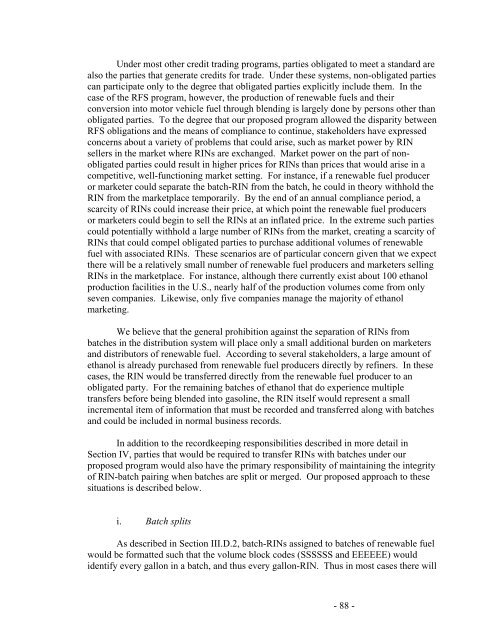Regulation of Fuels and Fuel Additives: Renewable Fuel Standard ...
Regulation of Fuels and Fuel Additives: Renewable Fuel Standard ...
Regulation of Fuels and Fuel Additives: Renewable Fuel Standard ...
You also want an ePaper? Increase the reach of your titles
YUMPU automatically turns print PDFs into web optimized ePapers that Google loves.
Under most other credit trading programs, parties obligated to meet a st<strong>and</strong>ard are<br />
also the parties that generate credits for trade. Under these systems, non-obligated parties<br />
can participate only to the degree that obligated parties explicitly include them. In the<br />
case <strong>of</strong> the RFS program, however, the production <strong>of</strong> renewable fuels <strong>and</strong> their<br />
conversion into motor vehicle fuel through blending is largely done by persons other than<br />
obligated parties. To the degree that our proposed program allowed the disparity between<br />
RFS obligations <strong>and</strong> the means <strong>of</strong> compliance to continue, stakeholders have expressed<br />
concerns about a variety <strong>of</strong> problems that could arise, such as market power by RIN<br />
sellers in the market where RINs are exchanged. Market power on the part <strong>of</strong> nonobligated<br />
parties could result in higher prices for RINs than prices that would arise in a<br />
competitive, well-functioning market setting. For instance, if a renewable fuel producer<br />
or marketer could separate the batch-RIN from the batch, he could in theory withhold the<br />
RIN from the marketplace temporarily. By the end <strong>of</strong> an annual compliance period, a<br />
scarcity <strong>of</strong> RINs could increase their price, at which point the renewable fuel producers<br />
or marketers could begin to sell the RINs at an inflated price. In the extreme such parties<br />
could potentially withhold a large number <strong>of</strong> RINs from the market, creating a scarcity <strong>of</strong><br />
RINs that could compel obligated parties to purchase additional volumes <strong>of</strong> renewable<br />
fuel with associated RINs. These scenarios are <strong>of</strong> particular concern given that we expect<br />
there will be a relatively small number <strong>of</strong> renewable fuel producers <strong>and</strong> marketers selling<br />
RINs in the marketplace. For instance, although there currently exist about 100 ethanol<br />
production facilities in the U.S., nearly half <strong>of</strong> the production volumes come from only<br />
seven companies. Likewise, only five companies manage the majority <strong>of</strong> ethanol<br />
marketing.<br />
We believe that the general prohibition against the separation <strong>of</strong> RINs from<br />
batches in the distribution system will place only a small additional burden on marketers<br />
<strong>and</strong> distributors <strong>of</strong> renewable fuel. According to several stakeholders, a large amount <strong>of</strong><br />
ethanol is already purchased from renewable fuel producers directly by refiners. In these<br />
cases, the RIN would be transferred directly from the renewable fuel producer to an<br />
obligated party. For the remaining batches <strong>of</strong> ethanol that do experience multiple<br />
transfers before being blended into gasoline, the RIN itself would represent a small<br />
incremental item <strong>of</strong> information that must be recorded <strong>and</strong> transferred along with batches<br />
<strong>and</strong> could be included in normal business records.<br />
In addition to the recordkeeping responsibilities described in more detail in<br />
Section IV, parties that would be required to transfer RINs with batches under our<br />
proposed program would also have the primary responsibility <strong>of</strong> maintaining the integrity<br />
<strong>of</strong> RIN-batch pairing when batches are split or merged. Our proposed approach to these<br />
situations is described below.<br />
i. Batch splits<br />
As described in Section III.D.2, batch-RINs assigned to batches <strong>of</strong> renewable fuel<br />
would be formatted such that the volume block codes (SSSSSS <strong>and</strong> EEEEEE) would<br />
identify every gallon in a batch, <strong>and</strong> thus every gallon-RIN. Thus in most cases there will<br />
- 88 -
















